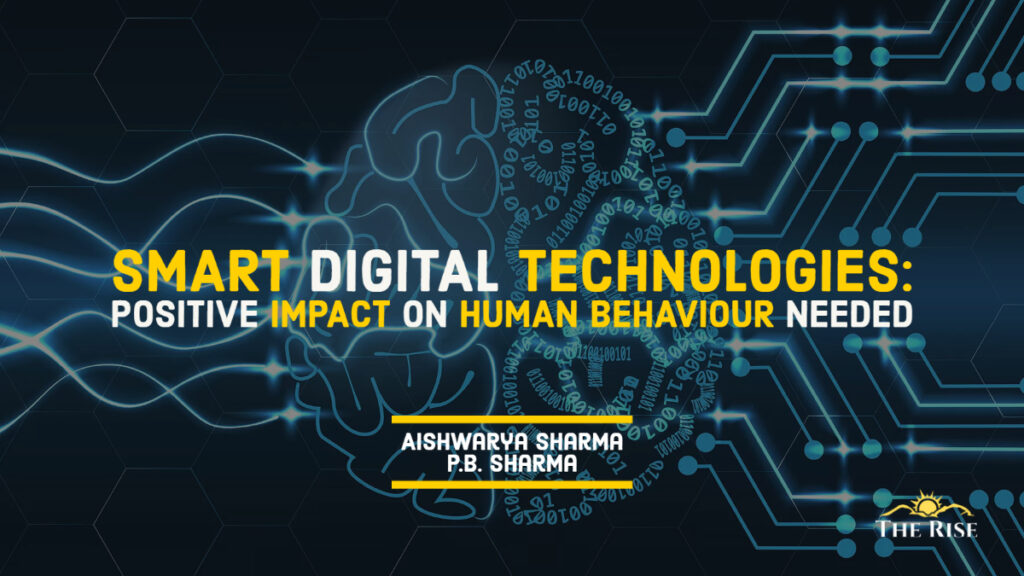The great opportunities facilitated by hyper-connectivity and smart digital technologies need to be utilized for creating a new world in which we the humans continue to live as social beings in harmony with nature and its pleasant diversity. The addictive use of smartphones with easy access to a lot of misguiding and misinformation regularly bombarded to the users on social media could reduce them as captive natives of some vested interests who may destroy the strength of our civilized societies and weaken the spine of our democracies. Technologies for conscious and righteous conduct need to be embedded as the codes of ethics and professional morals in handheld electronics and smart devices.
The mindboggling advancement of science and deep penetration of smart technologies into various aspects of the industry, trade, commerce, even the kitchens in the household, and in fact in all aspects of human endeavours are being rejoiced the world over. However, humankind was never ever earlier, as much dependent on technology and its applications as is today in the age of smart digital technologies. If anything, the COVID19 pandemic made societies globally abreast of digital technologies with much greater ease and speed. This was in total contrast to earlier prevailing hesitation for the adaptation of technology, as it was considered averse to the growth of human cognitive abilities.
The transformative effect of technology invasion has made its inroads into human behaviours and has influenced attitudes and relations with fellow beings. Now that the road to the adaptation of intelligent AI-powered technology applications is wide open from governance to e-marketing and through the internet of everything to every nook and corner of the workplace and the household, it is important to understand the phenomenal impact of modern technologies on human behaviour, attitude and on conduct.
Transformative effect of technology invasion has made itsinroads into human behaviours and has influenced attitudes and relations.
Netizens in Developing Countries More Vulnerable to Addictive Use of Smartphones
Ironically, the communities of netizens in the developing countries such as India, are spending the highest time on their smartphones, mostly clicking on social media for both information as well as for being misguided. It keeps them emotionally excited about the happenings that otherwise matter least for their wellbeing. The rising road rage, aggression in the neighbourhood, loss of empathy and compassion for the weak and needy, and above all loss of social engagement all are leading to creating a society of humans who tend to love to live for themselves rather than as the pre-digital era social beings of great empathy and Aatmiyata. It would, therefore, be important to look into the impact the extensive use of smartphones and connectivity to the networks have on the overall attitude, behaviour, and conduct of the people at large.
We live in a connected world, trade and transact in a connected economy, and have enormous ease of access to the large information and knowledge on the net that, if utilized with care and caution, could positively enhance our capabilities to make us wiser and more capable of translating the benefits of hyperconnectivity for ease of learning as well as ease of doing business. On the other hand, the addictive use of smartphones with easy access to a lot of misguiding and misinformation regularly bombarded to the users on social media could reduce them as captive natives of some vested interests who may destroy the strength of our civilized societies and weaken the spine of our democracies.
Also Read: Has COVID-19 Taught Us the Humility to Tackle Climate Change?
Global smartphone users have increased by 49.89% during the last 5 years (1977-2022), with 7.26 billion users in the world today accounting for 91.54% population of the world.
It is heartening to note that the global smartphone users have increased by 49.89% during the last 5 years (1977-2022), with 7.26 billion users in the world today accounting for 91.54% population of the world as per Statista, May 2022. While the highest number of users is still in China, 918.45 million, the United States has the highest smartphone penetration with 270 million smartphones amounting to 81.60% of its population. In India too, the mobile penetration has touched a new high at 1.18 billion mobile connections in 2021, out of which 600 million-plus are with smartphones. It is important to realize that developing countries are spending more time on smartphones – Brazil topped the list with 5.26 hours per day, India at 4.44 while in China an average user spends 3.1 hours per day as per the Statista study published in March 2022.
Addictive Use of Smartphones May Have Long Term Effects on Human Emotions
A study by Henry H. Wilmer, Lauren Lauren E. Sherman, and Jason M. Chein (Smartphones and Cognition: A Review of Research Exploring the Links between Mobile Technology Habits and Cognitive Functioning, 2017) has brought out that “while smartphones and related mobile technologies are recognized as flexible and powerful tools that, when used prudently, can augment human cognition, there is also a growing perception that habitual involvement with these devices may have a negative and lasting impact on users’ ability to think, remember, pay attention, and regulate emotion”.
Extensive use of smartphones has been found to significantly impact the IQ and shorten the attention span that directly impairs one’s ability to utilize competence and abilities.
Besides mental health implications, the extensive use of smartphones and their addictive dependence has also been found to significantly impact the IQ and shorten the attention span that directly impairs one’s ability to utilize competence and abilities for problem-solving. It also has a direct bearing on lowering empathy and diminishing satisfaction with life, ultimately fostering antisocial behaviour, leading individuals to a life of reclusion and eventual isolation as pointed out by Dr. Alexandro Pando in his Forbes article Tech And Its Impact On Behavior (2019)
The Positive Side of Smart and Intelligent Technologies
But then, let us not forget the positive side of the smart and intelligent technologies including the current and future uses of AI and Machine Learning in enhancing our learnability in class as well as outside the classroom, in groups and teams for problem-solving, fostering new-age technology innovations for greeting the mega challenges such as climate change, water, and food security that require working together with a scientific mind utilizing large scale data analytics, often in teams cutting across the boundaries of nations and even the continents. The great opportunities facilitated by hyper-connectivity and smart digital technologies need to be utilized for creating a new world in which we the humans continue to live as social beings in harmony with nature and its pleasant diversity. After all, the human spirit cannot negate its honorous responsibilities towards its fellow beings as well as the environment around the globe that sustains the happiness and bliss on planet Mother Earth. Our responsibility to the basics of life, such as the right to breathe good quality air and the right to access clean and potable water, availability of food for survival, and above all, an environment of peace and harmony cannot be overstated, no matter how much integration of smart and intelligent technologies takes place in our daily lives including at the workplace. It is here that we need to be humans and go back to the basics of empathy and sustainability in the age of augmented technology.
Intelligent technologies are enhancing our ability for problem-solving, fostering new-age technology innovations that require working together, often in teams cutting across the boundaries of nations and even the continents.
New Tech Innovations Need to Be More Responsive
We need to develop new smart and intelligent technologies that, besides creating the ease of doing business, also positively impact the human behaviour to protect them and the planet from the misuse of the enormous power of technology and pay greater attention to sustainability, empathy, and compassion so important for a blissful life on planet Mother Earth.
Also Read: Metamorphosing Industry 4.0 to Industry 5.0 Requires Engineers From All Domains
There is no denying that our usage and even dependence on technology is going to go further up as we begin to embrace a new dawn of an AI-powered augmented age where technology, humanity, and nature would have to work together as partners in progress in harmony and in peace with each other creating a better world to live and manifest the infinite potential of human in supporting the beauty and diversity of the grand designs of nature that have enough for everyone’s needs but surely not enough for everyone’s greed.
Technologies for conscious and righteous conduct need to be embedded as the codes of ethics and professional morals in handheld electronics and smart devices.
The technologies for conscious and righteous conduct need to be embedded as the codes of ethics and professional morals in handheld electronics and smart devices both at home as well as at the workplace and these are to be given greater attention for the development of new tech innovations in the campuses of the universities where the younger minds need to be sensitized about their importance at an early stage of their life.
Also Read: Technological Transformation in Higher Education: Myths and Realities
For example, algorithms can be now developed that map out the behaviour and conduct of a human from the uses of the smart electronics devices that shall set alarms at the early stage of their ill effect to warn the users of their impact. At the same time, new-age technologies could be embedded in smart devices such as smartphones, laptops, and other handheld devices that could counsel as well as positively mentor the users to align them towards more humane and righteous conduct. Such alarms and mentorship could be showcased in the form of the calls from the soul within the individuals and the devices that they use. This will go a long way in improving both the mental health of the individuals and their responsive behaviour.
Disclaimer: The views expressed in this article are of the authors solely. TheRise.co.in neither endorses nor is responsible for them.













Pingback: North East Festival-A Roadmap To Domestic And Global Ties - TheRise.co.in